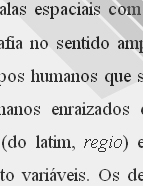

................................
Published in the early 20th century, this work would long remain an isolated example in the context of regional and local historiographical production due to its socio-historical approach and its way of integrating geography and ethnology into the explanatory framework for the settlement and organisation of rural space in northern Portugal. In two other scientific fields, regional studies were innovative and highly productive during this period: ethnography and human geography. In both, the best works and authors display a concern with the origin and historical transformations of the realities observed in the present. Historical references appear in the works of anthropologist Jorge Dias (1907-1973) on agrarian communalism and agricultural tools, but they are essential in the studies of geographer Orlando Ribeiro (1911-1997), whose example led to a research line on "Historical, Regional, and Local Geography" within the Centre for Geographical Studies at the Faculty of Arts of the University of Lisbon, which he founded in the early 1940s. Mention should also be made of the works of Raquel Soeiro de Brito, António de Brum Ferreira, and Carlos Alberto Medeiros, dedicated to various Azorean islands. Regarding the mainland, works such as Carminda Cavaco's study on the eastern Algarve and Maria Alfreda Cruz's on the southern bank of the Tagus estuary can be cited. In the same interdisciplinary and historical-geographical line, Jorge Gaspar continued, notably with his study on “Os portos fluviais do Tejo” ["The River Ports of the Tagus"] (1970). In the 1960s, signs of a renewal in regional and local historical studies began to emerge in Portugal, influenced by more specialised works conducted within academia. The best example came from abroad with Albert Silbert's innovative work on the agrarian history of the Beira Baixa and Alentejo regions, presented at the Sorbonne in 1963 for his doctoral thesis (Le Portugal Méditerranéen à la fin de l'Ancien Régime, 1966). Silbert closely follows the theoretical and methodological lessons of Marc Bloch for the study of rural regions and is concerned with comparing Portuguese agricultural landscapes and cultivation systems with others already studied in European, African, and American contexts. The French historian's research was supported by local scholars, notably José Ribeiro Cardoso, who had directed the work Subsídios para a História Regional da Beira Baixa [Contributions for the Regional History of Beira Baixa], sponsored by the Provincial Junta de Beira Baixa and integrated into the vast collection of publications of the Dual Centennial. At the end of the 1960s, Joaquim Romero Magalhães' undergraduate thesis, later published in 1970 as Para o Estudo do Algarve Económico Durante o Século XVI [Towards the Study of Economic Algarve in the 16th Century] under the supervision of V. M. Godinho and the influence of French historiography, was part of a renewal movement that would later bear fruit.
